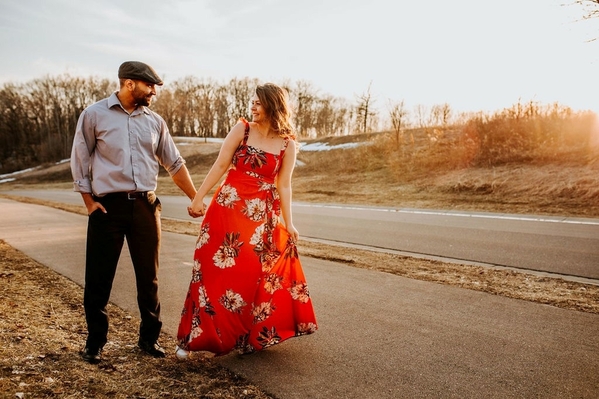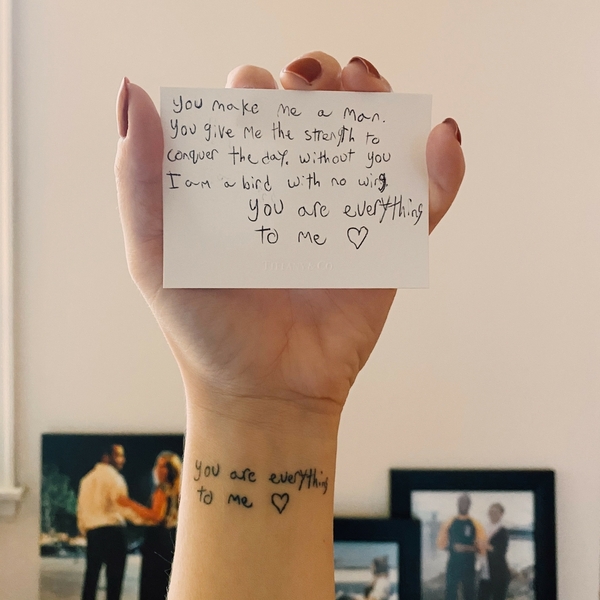On Sept. 16, 2020, the Asthma and Allergy Foundation of America (AAFA) released our Asthma Disparities in America report. This report looks at how asthma affects Black, Hispanic and American Indian/Alaska Native groups in the United States.
After coming across this report, Valerie Vison reached out to share her story. In the essay below, you’ll hear from Valerie, who lost her husband, Jordan, to asthma on July 22.
By Valerie Vison, Jordan’s wife
Jordan and I share two stories together. We have our love story, and we have the story of how I lost him.
Our love story is one I don’t think I could ever tell you just right. It’s one I honestly think Jordan is much better at telling. But what I can tell you is this – Jordan walked into my life when I was 16 years old. At the time, I wasn’t sure who I was, what I needed or where I was going. I had just been discharged from a drug and rehab facility five months prior when I was asked to attend a leadership camp for high school juniors.
That camp saved my life. It’s also what brought Jordan to me.
His light drew me in like nothing ever has before. Two years later, when I was 18 and he was 19, we started dating. From that day, I knew he was my forever, and I knew I was his.
Over the course of the next 11 1/2 years, Jordan and I have created a life we had always dreamed of. Together we traveled to many different places. We climbed to the highest point in Kyoto, Japan. We floated down rivers in Thailand. And we consumed our weight in goat cheese in Amsterdam. We adopted four cats who all literally fell into our lives. In 2019, on our 10-year anniversary, we eloped in one of our favorite cities, New Orleans.
Every step, every challenge, we faced it together. I’ve never wanted to think about what I would ever do without him.

On July 21, I went to bed with Jordan for the last time.
Four nights earlier, I woke up in the middle of the night to the sound of Jordan struggling to breathe. For anyone who has asthma or cares for someone with asthma, it’s the sound you don’t ever want to hear.
It became immediately clear that we needed to dial 911. Once the paramedics stabilized him, it felt like we were out of the woods. He spent the rest of the night in the ER, but he was OK.
Over the next four days, our lives returned to normal. He was discharged from the ER with aftercare directions, all of which he dutifully followed. It felt like he was in “recovery mode” and that everything was going to be OK.
It wasn’t OK though. I could never explain what the following Tuesday was like. At 1:20 a.m., I woke up to the sound of Jordan suffering from another attack. Everything in my bones told me this was worse. It all felt like it was unraveling so much quicker.
Over the next five minutes, I did everything I possibly could to pull him back to safety. I tried so desperately to fix it, but I couldn’t. Jordan passed away before the first responders arrived just five minutes later at 1:25 a.m.
Sitting there in a hospital room, the same words repeated over and over in my mind. He’s dead. Every single time those words ran through my mind it shattered every part of my body. And I felt like I had no idea what happened.
I knew the obvious, it had started as an asthma attack. I knew whatever had happened had caused his heart to ultimately stop.
But I had no idea how. Jordan was healthy. He loved the gym far more than most people.
That’s what made all of this so much more baffling. It came out of nowhere. When I received his death certificate three weeks later, I felt even more confused. For the first time I read the official cause of death: asthma.
Suddenly this condition Jordan’s lived with for nearly 31 years, a condition I’ve helped him manage for the last 11 years, made no sense. This wasn’t on our radar. Whenever we discussed worst case scenarios when it came to his asthma, it never included this.

In the weeks after his death, I began researching and analyzing every bit of information I could find regarding asthma. I needed to know more. I wanted to know what we had missed. What I found, though, was something I wasn’t expecting.
By this point, most people know that racial disparities in our health care system exist. What neither Jordan nor I knew was that it was actively affecting our lives.
As a Black American, Jordan was three times as likely to die from his asthma. He was five times as likely to visit the ER because of it.
How did we not know this? Why does no one know this? Or at least why isn’t anyone talking about it?
I can’t say that knowing about racial disparities would have changed anything. Or maybe it would have changed everything. What I know is that Jordan should have never died from asthma at the age of 30. It’s something that absolutely never should have happened.
While I couldn’t save Jordan, I hope that by telling his story we can save someone else.
AAFA is grateful for the opportunity to help share Valerie’s story and help honor Jordan’s memory. Bold changes are needed to reduce the burden of asthma on racial and ethnic minorities.
Sign up for AAFA's community to stay up to date about the following opportunities to get involved:
- Advocate for people affected by health disparities
- Get invitations to special events with expert speakers
- Participate in patient-centered research and clinical trials
- Join our Patient and Family Advisory Council
- Receive peer-to-peer support
You can also donate to support AAFA's mission to create real and lasting change.



Comments (1)